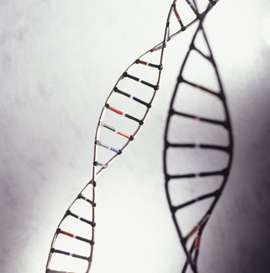Gene key for chemically reprogramming human stem cells

Scientists have discovered the gene essential for chemically reprogramming human amniotic stem cells into a more versatile state similar to embryonic stem cells, in research led by UCL and Heinrich Heine University.
The finding is an important step towards deriving reprogrammed cells that could be stored and used in therapies and research, providing an ethical alternative to human embryonic stem cells.
The study, published today in Molecular Therapy, found that the OCT4 gene needs to be reactivated to allow amniotic fluid cells to be rejuvenated chemically and function like embryonic stem cells within 2-3 weeks.
The researchers found that if this gene is not reactivated, then the chemical reprogramming protocol will not be a success. The reprogrammed cells, like embryonic stem cells, are capable of developing into any cell type in the body - a property known as pluripotency.
Once treated, the pluripotent cells can develop into functioning cells of many different types, including liver, bone and nerve cells. They also maintain their pluripotent properties after being frozen and thawed.
"Chemical reprogramming of amniotic cells is very efficient as all the cells treated are successfully reprogrammed. We now know the gene OCT4 is essential and must be reactivated to induce pluripotency using only chemicals. If we block OCT4, the chemical cocktail that we used does not work. Therefore, the efforts to develop chemical reprogramming need to focus on reactivating OCT4," said Dr Pascale Guillot (UCL Institute for Women's Health), who carried out the research with Professor Paolo De Coppi (UCL Great Ormond Street Institute of Child Health) and Professor James Adjaye (Director of the Institute for Stem Cell Research and Regenerative Medicine at Heinrich Heine University, Duesseldorf).
Previously, the same team was the first to discover that human amniotic stem cells could be reprogrammed chemically without using foreign genetic material.
In their latest research, the team examined the cells individually and found the process was very efficient, as all the cells responded to the chemical treatment. They also found that of all the genes involved in the process, OCT4 is the one that must be activated or the treatment will fail.
In 2006, Shinya Yamanaka identified the OCT4 gene as one of four specific genes which could convert differentiated cells into pluripotent stem cells.
Professor Adjaye, added: "Our study further highlights the importance and relevance of establishing a bank of amniotic pluripotent stem cells for future applications in regenerative medicine and drug screening
















